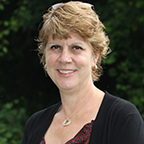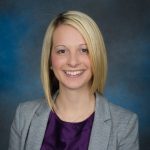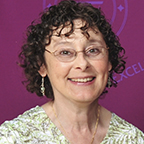Excelsior College employees, Erin Blauvelt and Kimberly Barss, were among the award recipients for the 2016 OLC Effective Practice Award from The Online Learning Consortium (OLC), the leading professional organization devoted to advancing the quality of online learning worldwide. The award was given to them at the upcoming OLC Innovate conference on April 20 in New Orleans.
OLC’s Effective Practice Awards recognize effective techniques, strategies and practices to advance quality and access to online programs. Effective practices are peer reviewed and evaluated within the framework of OLC’s five pillars of quality in online education: access, learning effectiveness, faculty satisfaction, student satisfaction and scale.
Erin Blauvelt of New York is a multimedia instructional designer for the College. Her day-to-day operations include selecting, planning, designing, creating and editing multimedia instructional activities and materials for all learners, including learners with disabilities.
“I believe the most effective practice that one can use in developing online learning programs is to look at your course, materials, and activities from the point of view of the learner,” said Blauvelt. “This could be of our average student (aged 37 with a full time job and family), a student with a certain learning preference, or a student with a disability, as we are serving through this award-winning project.”
Kim Barss of Texas is an instructional designer for the College. She works with a team of faculty program directors and subject matter experts looking for ways to apply best practices in learning theory, instructional design, multimedia learning theory, and accessibility standards. This is done to ensure that the course content maximizes student learning, engagement, and ultimately success.
“With respect to our accessibility project, much of what made it successful came from the support from leadership, having a well-organized and clearly articulated mission and plan, and wonderful colleagues who worked hard and were committed to the ADA accessibility project goals here at Excelsior as we were,” said Barss.
“We are delighted to honor the outstanding commitment and accomplishments of this year’s field of effective practice recipients,” said Kathleen S. Ives, D.M., chief executive officer and executive director, Online Learning Consortium. “Their inspired practices reveal their dedication to advancing online education and exemplify the innovation taking place throughout the online learning community.”
More information about the OLC Effective Practice Awards can be found online at http://onlinelearningconsortium.org/about/olc-awards/effective-practices/.
###
About Excelsior College
Excelsior College (http://excelsior.edu) is a regionally accredited, nonprofit distance learning institution that focuses on removing obstacles to the educational goals of adult learners. Founded in 1971 and located in Albany, NY, Excelsior is a proven leader in the assessment and validation of student knowledge. It offers more efficient and affordable access to degree completion through multiple avenues: its own online courses and college-level proficiency examinations, and the acceptance in transfer of credit from other colleges and universities as well as recognized corporate and military training programs. Excelsior College is accredited by the Middle States Commission on Higher Education.
About Online Learning Consortium
The Online Learning Consortium (OLC) is the leading professional organization devoted to advancing the quality of online learning worldwide. The member-sustained organization offers an extensive set of resources for professional development and institutional advancement of online learning, including, original research, leading-edge instruction, best-practice publications, community-driven conferences and expert guidance. OLC members include educators, administrators, trainers and other online learning professionals, as well as educational institutions, professional societies and corporate enterprises. Visit http://onlinelearningconsortium.org/ for more information.





